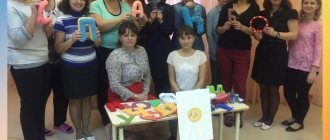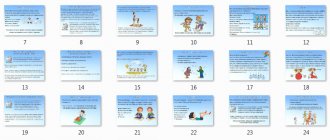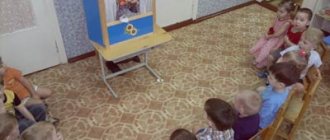Requirements for the speech of a kindergarten teacher
Components of professional speech of a preschool teacher
The importance of speech culture for a kindergarten teacher
MM. Alekseeva notes that, imitating adults, the child adopts “not only all the subtleties of pronunciation, word usage, and phrase construction, but also those imperfections and errors that are found in their speech.”
That is why high demands are placed on the speech of a teacher in a preschool educational institution today, and the problem of improving the teacher’s speech culture is considered in the context of improving the quality of preschool education.
The quality of speech development of a preschooler depends on the quality of speech of teachers and on the speech environment that they create in a preschool educational institution.
Researchers such as A.I. Maksakov, E.I. Tikheyeva, E.A. Flerin, paid special attention to the creation of a developmental speech environment in kindergarten as a factor in the development of children’s speech. In their opinion, preschool workers should be charged with creating an environment in which “children’s speech could develop correctly and unhindered.”
In modern studies of the problems of improving the teacher’s speech culture, the components of his professional speech and the requirements for it are highlighted.
The components of a teacher’s professional speech include:
quality of language design of speech;
value and personal attitudes of the teacher;
communicative competence;
clear selection of information to create a statement;
orientation towards the process of direct communication.
Among the requirements for the speech of a preschool teacher are:
Correctness – compliance of speech with language norms. The teacher needs to know and follow the basic norms of the Russian language when communicating with children: orthoepic norms (rules of literary pronunciation), as well as norms for the formation and modification of words.
Accuracy is the correspondence between the semantic content of speech and the information that underlies it.
Logicity is the expression in semantic connections of the components of speech and the relationships between the parts and components of thought.
Purity is the absence in speech of elements alien to the literary language. Elimination of non-literary vocabulary is one of the tasks of speech development in preschool children.
When solving this problem, taking into account the leading mechanism of speech development of preschool children (imitation), the teacher needs to take care of the purity of his own speech: the use of filler words, dialect and slang words is unacceptable.
Expressiveness is a feature of speech that captures attention and creates an atmosphere of emotional empathy. The expressiveness of a teacher’s speech is a powerful tool for influencing a child. The teacher’s mastery of various means of expressive speech (intonation, tempo of speech, strength, pitch of voice, etc.) contributes not only to the formation of the arbitrary expressiveness of a child’s speech, but also to a more complete awareness of the content of an adult’s speech, and the formation of the ability to express his attitude to the subject of conversation.
Richness is the ability to use all linguistic units in order to optimally express information. The teacher should take into account that in preschool age the foundations of the child’s vocabulary are formed, therefore the rich vocabulary of the teacher himself not only helps to expand the child’s vocabulary, but also helps to develop his skills in the accuracy of word use, expressiveness and figurative speech.
Relevance is the use in speech of units that correspond to the situation and conditions of communication. The appropriateness of a teacher’s speech presupposes, first of all, having a sense of style. Taking into account the specifics of preschool age aims the teacher at developing a culture of speech behavior in children (communication skills, the ability to use various formulas of speech etiquette, focus on the communication situation, the interlocutor, etc.).
It must be remembered that expanding children's vocabulary is not achieved only by mechanical memorization of words. It is necessary to help the child understand the meaning of a new word, teach him to use the word in the process of storytelling, in communication with others, through his own speech.
Having developed speech , a child will be more ready for school. The knowledge passed on to him by teachers will be easier to perceive, and there will be fewer problems when communicating with peers and answering at the board.
The above requirements include the correct use of non-verbal means of communication by the teacher, his ability not only to speak with the child, but also to hear him.
Along with the requirements for the teacher's speech, it is necessary to say about the requirements of the teacher for children .
1. The teacher must not only give a speech sample to the children, but also check how the children have mastered it.
2. It is necessary to cultivate in children an interest in the ability to speak correctly (using incentives, an example of well-speaking children).
3. It is necessary to systematically monitor children’s speech, listen to how children speak, and correct mistakes in a timely manner.
Serious attention should be paid to children’s speech both in everyday life and in the classroom.
In all classes in kindergarten, teachers widely use questions as a method of teaching children. A question from a teacher is a very effective method of teaching children to think and speak, since a question directs attention, stimulates thought, teaches precision in listening, and activates speech.
In order for questions to fulfill their purpose, they must satisfy certain requirements:
The first requirement is that the question must have a certain content . In the practice of conducting classes, unnecessary questions are often asked that are unnecessary for the intended program content, and sometimes even empty and even meaningless questions.
The second requirement for the question is accuracy and specificity .
The accessibility of a question also depends on its wording.
Careless, incorrect construction of the question makes it difficult to understand. The brevity of the formulation is of great importance for the clarity of understanding of the issue. Striving for accuracy and brevity, some teachers go to the other extreme: excessive brevity also makes the question incomprehensible.
A very important requirement is purposefulness and consistency in asking questions to children.
The teacher must remember that the purpose of asking questions is for children to assimilate the intended program material . Therefore, questions should be asked not about everything that can be said on a given topic, but about the main, most important thing. Questions should be targeted. This purposefulness of the questions also determines their sequence.
Thus, the main requirements for the question as a teaching method come down to the following: attention to the semantic meaning of the question, to accuracy, brevity and correctness of formulation; the question must be understandable to children and targeted; It is necessary to maintain consistency in asking questions.
Consultation-workshop for preschool teachers “Speech culture of preschool teacher
Consultation-workshop for preschool teachers
“The culture of speech of a preschool teacher
Goal: improving speech culture as a component of the professional competence of a preschool teacher.
Tasks:
- To clarify and consolidate educators’ knowledge about the cultural and methodological requirements for teacher speech; Improve the quality of linguistic design of statements using basic language norms; Contribute to the formation of professional communicative competence of teachers.
Event plan:
I. Justification of the problem. Requirements for the quality of speech of a preschool teacher. The concept of “speech culture”.
II. Workshop “Test your literacy.”
III. Sayings of great people about speech.
Part I
Requirements for the quality of speech of a preschool teacher.
It is no coincidence that it is believed that a person’s speech is his calling card, since his success not only in everyday communication, but also in professional activities depends on how competently he expresses himself. This statement is especially relevant in relation to the speech of a teacher working with preschool children.
Preschool age is a sensitive period for a child’s speech development, therefore one of the leading activities of a kindergarten teacher is the formation of oral speech and verbal communication skills, based on knowledge of the native literary language.
One of the main mechanisms for children to master their native language is imitation.
notes that, imitating adults, the child adopts “not only all the subtleties of pronunciation, word usage, and phrase construction, but also those imperfections and errors that are found in their speech.”
That is why today high demands are placed on the speech of a teacher of a preschool educational institution, and the problem of improving the culture of a teacher’s speech is considered in the context of improving the quality of preschool education.
The quality of speech development of a preschooler depends on the quality of speech of teachers and on the speech environment that they create in a preschool educational institution.
Researchers such as , paid special attention to the creation of a developing speech environment in kindergarten as a factor in the development of children's speech. In their opinion, preschool workers should be charged with creating an environment in which “children’s speech could develop correctly and unhindered.”
In modern studies of the problems of improving the teacher’s speech culture, the components of his professional speech and the requirements for it are highlighted.
The components of a teacher’s professional speech include:
- quality of language design of speech; value and personal attitudes of the teacher; communicative competence; clear selection of information to create a statement; orientation towards the process of direct communication.
Among the requirements for the speech of a preschool teacher are:
Correctness – compliance of speech with language norms. The teacher needs to know and follow the basic norms of the Russian language when communicating with children: orthoepic norms (rules of literary pronunciation), as well as norms for the formation and modification of words.
Accuracy is the correspondence between the semantic content of speech and the information that underlies it. The teacher should pay special attention to the semantic (notional) side of speech, which contributes to the development of children's skills of accurate word use.
Logicity is the expression in semantic connections of the components of speech and the relationships between the parts and components of thought. The teacher should take into account that it is in preschool age that ideas about the structural components of a coherent utterance are laid down, and the skills of using various methods of intratextual communication are formed.
Purity is the absence in speech of elements alien to the literary language. Elimination of non-literary vocabulary is one of the tasks of speech development in preschool children. When solving this problem, taking into account the leading mechanism of speech development of preschool children (imitation), the teacher needs to take care of the purity of his own speech: the use of filler words, dialect and slang words is unacceptable.
Expressiveness is a feature of speech that captures attention and creates an atmosphere of emotional empathy. The expressiveness of a teacher’s speech is a powerful tool for influencing a child. The teacher’s mastery of various means of expressive speech (intonation, tempo of speech, strength, pitch of voice, etc.) contributes not only to the formation of the arbitrary expressiveness of a child’s speech, but also to a more complete awareness of the content of an adult’s speech, and the formation of the ability to express his attitude to the subject of conversation.
Richness is the ability to use all linguistic units in order to optimally express information. The teacher should take into account that in preschool age the foundations of the child’s vocabulary are formed, therefore the rich vocabulary of the teacher himself not only helps to expand the child’s vocabulary, but also helps to develop his skills in the accuracy of word use, expressiveness and figurative speech.
Relevance is the use in speech of units that correspond to the situation and conditions of communication. The appropriateness of a teacher’s speech presupposes, first of all, having a sense of style. Taking into account the specifics of preschool age aims the teacher at developing a culture of speech behavior in children (communication skills, the ability to use various formulas of speech etiquette, focus on the communication situation, the interlocutor, etc.).
Of course, the teacher of a preschool educational institution’s knowledge of these requirements, their compliance and constant improvement of the quality of his speech is the key to the success of work on the speech development of children in preschool educational institutions.
What is speech culture?
First of all, this is the degree of proficiency in language norms (in the field of pronunciation, stress, word usage and grammar) as well as the ability to use all expressive means of language in different conditions of communication (communication) and in accordance with the goals set in the content of statements.
In addition, the culture of speech is a special linguistic discipline aimed at studying and improving the literary language as an instrument of national culture, the guardian of the spiritual wealth of the people.
Cultural speech is an essential element of a person’s general culture.
Unfortunately, in practice it happens that the following shortcomings are encountered in the speech of teachers:
- unclear articulation of sounds during speech; letter-by-letter pronunciation of words, when words are pronounced as they are written (“what” instead of “what”; “his” instead of “evo”); pronouncing words with an accent or with characteristic features of the local dialect; incorrect stress in words; monotonous speech, in which children’s interest in the content of the statement sharply decreases; accelerated rate of speech, which makes it very difficult for children to understand speech; verbosity, layering of unnecessary phrases and details; saturation of speech with complex grammatical structures and phrases; the use of colloquialisms and dialectisms, outdated words; frequent unjustified use of words with diminutive suffixes (“Tanya, wash your hands!”, “Katenka, remove the cup from the table!”); contamination of speech with words - parasites (well, so to speak, etc.); copying the speech of babies, “lisping”; using words in speech that children do not understand, without clarifying their meaning, etc.
The following requirements are imposed on the teacher’s speech:
- correctly pronounce all the sounds of your native language; clearly pronounce and articulate sounds, clearly pronounce the endings of words and each word in a phrase; strictly adhere to orthoepic norms in speech; correctly place stress in words; use means of intonation expressiveness of speech (voice strength, rhythm, tempo, logical stress, pauses); when communicating with children, use speech at a slightly slower pace and moderate volume; convey the content of texts coherently, in an accessible form, accurately using words and grammatical structures, taking into account the child’s age and level of speech development; Use a friendly tone when speaking with children and staff.
Part II.
Workshop “Test your literacy.”
The form of organization of teachers is small groups of 4 people.
Correct speech is the foundation of linguistic culture; without it there is and cannot be either literary artistic mastery or the art of the living and written word.
1.1 Grammatical correctness.
Conjugate the verbs: run, want.
In what case is the form of the verb “run” used?
Form the imperative form of the verbs:
Go – go (those); run - run(those); wave – wave (those), wave (those); sit down - sit down (those); lie down - lie down (those).
Determine the gender of nouns and use the word in the correct form:
The windows are curtained (tulle)
Face hidden (veil)
The roof is being covered (tar paper)
Wash my hair (shampoo)
Head covered (shawl)
Complete the sentences using the noun in the correct form:
I stood up, taking the child off my lap.
There are a lot of (apple trees), (cherries), (currants) in the garden.
The flu quarantine lasted 22 (days).
I bought all the gardening tools except (rakes).
1.2 Orthoepic correctness.
Place the emphasis and read the words: calling, more beautiful, pampering, pampering, spoiled, thinking, expert, money, plum, beets, cottage cheese, provision.
Correctly use words in the genitive singular: bandage, pancake, cake, bow, goose.
Correctly use words in the accusative case singular: board, river, cheek, beard, wall, harrow.
1.3. Vocabulary.
Correct sentence:
He is a complete ignoramus in matters of art.
The boy put on his coat and hat and went for a walk.
Kolya is the leading leader of our group.
When I returned back to my friends, everyone was very happy.
The conversation with the children came to its final end.
All children completed the assigned task on time.
The doctor prescribed medicine for the children.
1.4. Spelling.
Vocabulary dictation: plasticine, art, applique, feel, charm, participate, safe, association, retelling, storytelling
Part III.
Sayings of great people about speech.
The word is one of man's greatest weapons. Powerless in itself, it becomes powerful and irresistible when said skillfully, sincerely and on time ().
Tell me the word and I will tell you who you are! (Socrates.)
There are people who speak beautifully, but write far from it. This is because the place, the listener, etc. heats them up and draws out more from their minds than they could give without that heat. (B. Pascal.)
Those who claim that they have a lot of thoughts in their heads, but cannot express them due to lack of eloquence, have not learned to understand themselves. (M. Montaigne.)
Who among us doesn’t want to learn how to speak eloquently and convincingly! After all, the word accompanies us everywhere, and our language is a sign of intelligence or stupidity. Every intellectual profession is a speech one, therefore “the path in any career is strewn with the flowers of eloquence” ().
He who keeps his mouth and his tongue keeps his soul from troubles. (From the Book of Solomon's Proverbs.)
Those who cannot speak will not make a career. (Napoleon.)
The word is the clothing of all facts, all thoughts. (Maksim Gorky)
RECOMMENDATIONS FOR TEACHERS
to fulfill the requirements for teacher speech
Today, high demands are placed on the speech of a teacher in a preschool educational institution, and the problem of improving the teacher’s speech culture is considered in the context of improving the quality of preschool education.
The speech of the teacher, who is constantly in the child’s field of vision, is an important source from which children draw an example of their native language and speech culture.
And the knowledge of the teacher of a preschool educational institution of the requirements for his speech, compliance with and constant improvement of the qualities of his speech is the key to the success of work on the speech development of children in preschool educational institutions.
Requirements for teacher speech:
- correctly pronounce all the sounds of your native language; clearly pronounce and articulate sounds, clearly pronounce the endings of words and each word in a phrase; strictly adhere to orthoepic norms in speech and correctly place stress in words; use means of intonation expressiveness of speech (voice strength, rhythm, tempo, logical stress, pauses); when communicating with children, use speech at a slightly slower pace and moderate volume; convey the content of texts coherently, in an accessible form, accurately using words and grammatical structures, taking into account the child’s age and level of speech development; Use a friendly tone when speaking with children and staff.
- Material taken from the site https://berezka11-kir2.kinderedu. ru/pedagogam/praktikumyi/ Prepared by
Get text
The role of a teacher’s speech culture in the upbringing of a preschooler
The modern system of preschool education is developing as open, variable, focused on providing quality educational services to families with preschool children. The problems of providing new approaches to organizing the pedagogical activities of a kindergarten, its interaction with the family and primary school are brought to the fore, and emphasis is placed on the effectiveness of the processes of socialization and individualization of the personality development of a preschooler.
The federal state educational standard for preschool education notes that the conditions necessary to create a social situation for the development of children that corresponds to the specifics of preschool age involve ensuring emotional well-being through:
– direct communication with each child;
– respectful attitude towards each child, his feelings and needs;
– development of children’s communication abilities, allowing them to resolve conflict situations with peers.
In this regard, the need for a professional educator who, taking into account changing socio-economic conditions and the general situation in the education system, is becoming increasingly urgent, can independently make responsible decisions and predict their possible consequences, and is capable of cooperation. This is a teacher characterized by mobility and dynamism. During the development of society, the requirements for any form of social activity are invariably associated with culture. A high level of culture is a necessary condition for the effectiveness of any work, and especially pedagogical work. The professional and pedagogical culture of a preschool teacher is largely determined by the level of his pedagogical training and the desire for self-improvement in the conditions of professional activity.
In modern conditions, the competitive resource of a teacher’s activity is not so much special knowledge, possession of information, mastered technologies of training and education, but rather a general and professional pedagogical culture that ensures personal development, going beyond the boundaries of normative activities, and the ability to create and transmit values.
The teacher’s speech culture plays a major role in the development of children, since the development of a child in preschool age develops mainly in the course of communication with adults. Not being able to think critically, children of this age imitate everything they see and hear in the environment, but most of all those people who are directly connected with them, towards whom the children have developed a positive attitude. Such a close person with whom a child is directly connected in kindergarten is the teacher. He must master communication skills with children of different ages and various psychological and pedagogical features of development.
The leading signs of the pedagogical communication skills of a preschool teacher are: the need to communicate with children; positive emotional tone of communication; the dominant feeling of satisfaction from communication and the organized educational process; understanding of children, ability to establish individual and group contacts; the ability to constructively resolve interpersonal contradictions; humanism and democracy of communication; aesthetics of communication.
The implementation of the communicative function requires a transition from the authoritarian position of the teacher to personal, equal cooperation and co-creation with the child.
When communicating with children, observing their games, the teacher needs to record manifestations of positive and negative speech behavior in children. Later, telling the children about who surprised and pleased us with what today, the teacher should explain what and how best to say to each other (adults) in a given situation. You should purposefully introduce words and figures of speech into children’s dictionaries that will help them master cultural speech skills: “It seems to me that you were mistaken...”, “You could not...”, “I advise you...”, “I think that... ", "Don't be offended, but your behavior today cannot be called decent. I’ll try to explain..." [4]..
In the works of Kurochkina I.N. it is said that it is important for the teacher to control his speech behavior:
— are you trying, when giving an order, to explain to your child the reason that prompted you to turn to him... (“Unfasten the clasps on your shoes. You will crumple the backs, and the shoes will rub your heels. And the shoes will look unsightly”);
— how often do you use the phrase “Why don’t you try...”;
— do you express to your child the satisfaction you received from the conversation with him (“You are so interesting to listen to! Tell me something more about your new friend!”);
- Do you admire the child’s action or the result of his activity (“You did it great!”)?
Kurochkina I.N. notes that the teacher’s constant monitoring of their speech, emotions and their self-esteem helps to comprehend their strengths and weaknesses from the point of view of their professional and social value. Irritability, arrogance, sullenness, hot temper, and imbalance interfere with the teacher and undermine his authority. Such manifestations cannot be justified by character, because this is the result of low demands on oneself [3].
Expanding vocabulary enriches a person and has a positive effect on his activities, in particular pedagogical ones. Communication with children obliges the teacher to thoughtfully use new words that are far in content from the world of children's thoughts. However, this does not mean that an adult cannot freely use the lexical wealth of his native language, because the main thing is to take into account the age characteristics of preschoolers and use words in speech that are accessible and understandable to them. When introducing a new word, the teacher explains its meaning and encourages children to use it in their speech.
Dubina L. emphasizes that good diction and correct literary pronunciation are what a teacher should have. A child needs to hear every word addressed to him, otherwise he will not understand what is being said to him. And incorrect pronunciation can be taken as a standard. Often, shortcomings in a child’s speech (burr, lisp, lisp) are a consequence not only of careless speech education, but also of the negative speech influence of adults. Pronunciation defects, reinforced by everyday practice, can become entrenched and become a habit in later life [2].
One of the significant factors is the detail of verbal communication, which largely determines the moral and emotional climate in kindergarten, employee relationships and performance. All this ultimately affects the quality of children's upbringing.
The culture of verbal communication brings beauty to people’s relationships, promotes their mutual understanding, strengthening human and industrial relations - a teacher should strive for this, his pedagogical ethics obliges him to do this.
The culture of verbal communication consists not only in what is said, but also in how it is said. The words “please”, “excuse me”, “good morning” that are familiar to us can sound friendly, welcoming, respectful or careless, cold, arrogant. It all depends on what tone we say them and with what facial expression. Intonation expressiveness of speech is an important factor in influencing a child. The teacher should try to talk to children using a diverse range of voice tones that emphasize the emotional and semantic content of what is said.
Grekhnev V.S. emphasizes that “intonations, calm and excited, restrained and lively, crafty and simple-minded, solemn and businesslike, questioning and affirmative, joyful and sad, inherent in human speech, help a small child to better understand what is being said to him and to feel the adult’s attitude to the event , action, object" [1].
One of the primary tasks of a teacher is to notice his own speech deficiencies, listen to his own speech and its architectonics. So, if an adult strives to make his speech more expressive, then he uses all intonation means: phrasal and logical stress, pauses, voice movement in pitch, strength, timbre; rate of speech.
Posture, facial expressions, and gestures, as is known, complement the expressiveness of speech and enhance understanding of what is being said. The teacher is like an actor who is fluent in the art of posture, facial expressions, and gestures. But under no circumstances should you overact: the slightest falsehood can backfire.
Thus, the culture of speech brings beauty to relationships between people, promotes their mutual understanding, and strengthens human and industrial relations. A teacher of a preschool educational institution should strive for this; his pedagogical ethics, which provide for a set of rules of communication and behavior of people professionally involved in the training and education of preschoolers, obliges him to do this.





